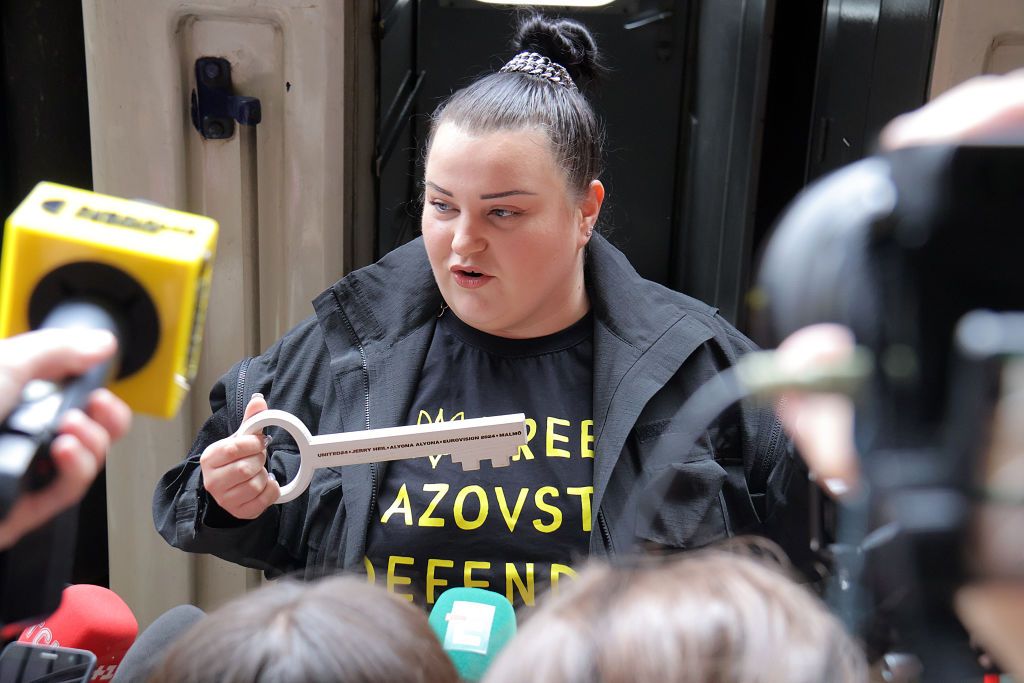The Ukrainian delegation at the Eurovision Song Contest was fined for wearing T-shirts with the logo “Free Azovstal Defenders,” despite a ban on political messaging. Ukrainian artist Alyona Alyona, along with Jerry Heil, won third place at the competition with their song “Teresa & Maria.” The delegation’s decision to wear the shirts was a risky move, as they had to hide them under their clothes to avoid detection. Despite incurring a fine from the European Broadcasting Union, they felt the risk was worth it to show support for the imprisoned Azovstal defenders who defended Ukraine’s last stronghold in Mariupol.
The families of captive Azov fighters are anxiously waiting for news as Russia obstructs prisoner swaps. Natalia Kravtsova last heard from her son shortly after he was captured by Russian troops in Mariupol, and has not had any contact since. The delegation’s display of support for the Azovstal defenders at Eurovision was a challenging task, with printers initially refusing to print the shirts. Despite the obstacles, they managed to get the shirts made and wore them during the event, resulting in a fine from the EBU. The risk of breaking the rules was justified for them to express solidarity with those in Russian captivity.
As Ukraine gears up for a peace summit in June, President Volodymyr Zelensky is hopeful for a prisoner exchange to free all Ukrainians held in Russia. Since the start of the invasion, Russia has captured thousands of Ukrainians, including soldiers and children. Zelensky sees the upcoming summit as an opportunity to negotiate the release of all Ukrainian prisoners before the end of the war. The situation remains tense as international pressure mounts for Russia to engage in a prisoner exchange and adhere to diplomatic efforts for peace.
The EBU has also cracked down on performers who attempted to show support for Palestine at Eurovision amid the ongoing conflict with Israel. Protesters criticized the inclusion of Israel in the 2024 contest, especially as the violence in Gaza continues to escalate. The EBU’s strict enforcement of rules regarding political messaging at the competition has sparked controversy, with some performers facing consequences for expressing their views. The situation highlights the complexities of navigating political statements in the context of international events like Eurovision.
The Eurovision Song Contest serves as a platform for artists to showcase their talents on a global stage, but it also brings to light political tensions and controversies. By fining the Ukrainian delegation for wearing T-shirts with a political message, the EBU underscored its commitment to maintaining the competition’s apolitical nature. However, the defiance of the ban by the Ukrainian artists reflects their determination to bring attention to important issues, such as the plight of the Azovstal defenders. The incident highlights the fine line between artistic expression and political advocacy in the context of a high-profile event like Eurovision.
The ongoing conflict between Russia and Ukraine has led to a humanitarian crisis, with thousands of Ukrainians captured and held in Russian captivity. As pressure mounts for a prisoner exchange and diplomatic resolution, the plight of the Azovstal defenders and other captives remains a pressing concern. The defiance of the ban on political messaging at Eurovision by the Ukrainian delegation demonstrates their commitment to raising awareness of these issues on the global stage. While the fine imposed by the EBU serves as a reminder of the competition’s rules, it also sparks debate about the role of political expression in events that transcend national boundaries.


